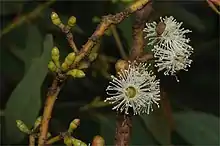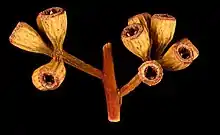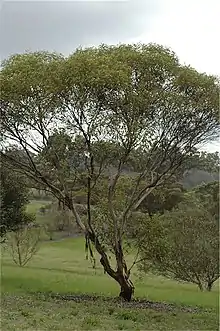Eucalyptus calcareana
Eucalyptus calcareana, commonly known as the Nundroo mallee or Nundroo gum,[2] is a mallee or a small tree that is endemic to the south coast of Australia. It has smooth, greyish or cream-coloured bark, lance-shaped or curved adult leaves, flower buds in groups of seven or nine, creamy-white flowers and cup-shaped to conical fruit.


| Nundroo mallee | |
|---|---|
 | |
| Eucalyptus calcareana in the Australian Botanic Garden Mount Annan | |
| Scientific classification | |
| Kingdom: | Plantae |
| Clade: | Tracheophytes |
| Clade: | Angiosperms |
| Clade: | Eudicots |
| Clade: | Rosids |
| Order: | Myrtales |
| Family: | Myrtaceae |
| Genus: | Eucalyptus |
| Species: | E. calcareana |
| Binomial name | |
| Eucalyptus calcareana | |
Description
Eucalyptus calcareana is a mallee or a small tree that typically grows to a height of about 8 metres (26.2 ft) and forms a lignotuber. It has smooth grey, cream-coloured, white and orange bark that is shed in short ribbons. Young plants and coppice regrowth have leaves arranged alternately and dull bluish green, egg-shaped to broadly lance-shaped 60–100 mm (2.4–3.9 in) long and 34–45 mm (1–2 in) wide. Adult leaves are lance-shaped to curved, the same glossy green on both sides, 75–140 mm (3.0–5.5 in) long and 10–25 mm (0.4–1 in) wide on a petiole 10–30 mm (0.39–1.2 in) long. The flower buds are borne in groups of seven or nine in leaf axils on an unbranched peduncle 7–16 mm (0.28–0.63 in) long, the individual buds on a pedicel 1–5 mm (0.039–0.20 in) long. Mature buds are oval to cylindrical, 7–13 mm (0.28–0.51 in) long and 5–6 mm (0.20–0.24 in) wide with a conical operculum 2.5–6 mm (0.098–0.24 in) long. Flowering mainly occurs in March and April and the flowers are creamy white. The fruit is a woody cup-shaped or conical capsule 5–10 mm (0.20–0.39 in) long and 6–9 mm (0.2–0.4 in) wide on a pedicel 1–4 mm (0.039–0.16 in) long, the valves just above of slightly below the rim.[3][4][5][6][7][8]
Taxonomy and naming
Eucalyptus calcareana was first formally described in 1979 by Clifford Boomsma from specimens collected near Nundroo.[6][9] The specific epithet (calcareana) is derived from the Latin word calcareus meaning "of lime" or "limy"[10] referring to the soil type where this species grows.[4]
Distribution and habitat
Nundroo mallee is found along the south coast of the Goldfields-Esperance region of Western Australia and the south coast of South Australia.[8] It is found from the east of Esperance to coastal areas of the western Eyre Peninsula.[8][11]
Use in horticulture
This eucalypt is grown in exposed locations and is suitable as a windbreak or shade tree.[11]
See also
References
- "Eucalyptus calcareana". Australian Plant Census. Retrieved 1 April 2019.
- Dean Nicolle. "Native Eucalypts of South Australia". Retrieved 19 October 2016.
- "Eucalyptus calcareana (Myrtaceae) Nundroo Mallee". Seeds of South Australia. South Australian Seed Conservation Centre, Botanic Gardens of South Australia. Retrieved 1 April 2019.
- "Eucalyptus calcaareana Nundroo mallee, Nundroo gum". Euclid: Centre for Australian National Biodiversity Research. Retrieved 1 April 2019.
- Chippendale, George M. "Eucalyptus calcareana". Australian Biological Resources Study, Department of the Environment and Energy, Canberra. Retrieved 1 April 2019.
- Boomsma, Clifford David (1979). "Four new species of Eucalyptus L'Hérit. from South Australia" (PDF). Journal of the Adelaide Botanic Gardens. 1 (6): 361–363. Retrieved 1 April 2019.
- Nicolle, Dean (2013). Native eucalypts of South Australia. Adelaide: Dean Nicolle. pp. 130–131. ISBN 9780646904108.
- "Eucalyptus calcareana". FloraBase. Western Australian Government Department of Parks and Wildlife.
- "Eucalyptus calcareana". APNI. Retrieved 1 April 2019.
- Brown, Roland Wilbur (1956). The Composition of Scientific Words. Washington, D.C.: Smithsonian Institution Press. p. 484.
- "Eucalyptus calcareana Nundroo Mallee". Plant Selector. Botanic Gardens of South Australia. Retrieved 23 July 2017.